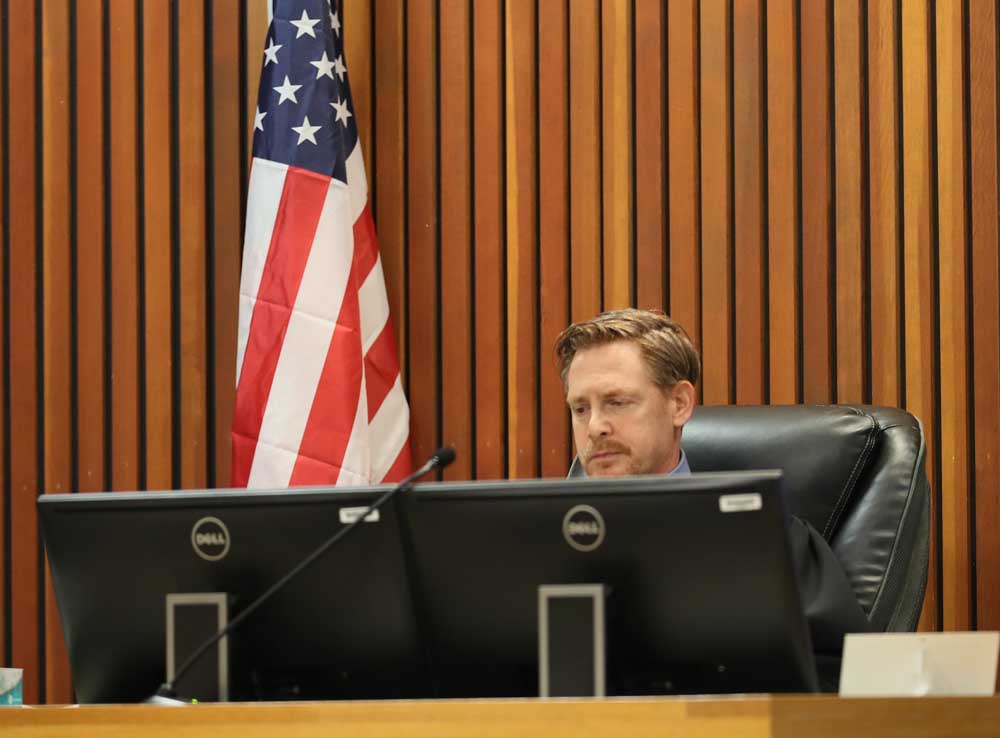Jackson County judge issues ‘crisis plan’ for public defenders
Published 5:30 pm Tuesday, September 5, 2023

- Judge Benjamin Bloom is expected to release a plan Friday to address the ongoing shortage of public defense lawyers.
If more attorneys cannot be added in Jackson County to represent indigent defendants, then the area’s current public defenders would have to increase their caseloads by 14% over the next year, according to a “crisis plan” released Tuesday by Benjamin Bloom, the presiding judge of Jackson County Circuit Court.
That plan came in response to Senate Bill 337, which, in part, asks all of the state’s presiding judges to issue plans to help solve the state’s shortage of public defense attorneys, who are not state employees and work on contract. The plans by each presiding judge were submitted to the Oregon Criminal Justice Commission, which will review them before contacting lawmakers.
The Jackson County plan includes 10 recommendations, not all of which Jackson County Circuit Court has the power to implement.
Some of the recommendations include asking the Legislature to pay public defenders more; possibly terminating attorneys from cases after 60 days if their client still has a warrant on them; and potentially hiring an additional attorney to solely handle arraignments.
But the plan’s striking analysis regarding attorney capacity says that while Jackson County public defenders are able to take on 371 cases per month, they would have to take on 422 cases a month, a 14% increase, to cover the current and unrepresented caseload over the next year.
“With this change to annual caseloads, all existing attorneys qualified for the case types affected would need to increase their caseload,” the plan states, adding that additional attorney capacity is needed in all case types, including murder, Jessica’s Law for sexual predators and sexual offenders, and Measure 11.
The plan ranks each of the 10 recommendations in order of importance, with a “substantial increase” in compensation for attorneys being the highest.
While the plan does not give a salary range for how much Jackson County public defenders should be paid, it does suggest the Office of Public Defense Services and the Legislature work together to “build pay around seniority as well as the difficulty of each pay type.”
“By adjusting compensation, more lawyers will start and remain in criminal defense work,” the plan stated.
The plan’s fifth recommendation calls for Jackson County Circuit Court to analyze whether it is constitutionally permissible to terminate a lawyer from a case if the defendant is wanted on a warrant for 60 days. The court will also assess whether to let attorneys withdraw from a case after the same time period. These solutions, the plan states, would not increase an attorney’s ability to add new cases to his or her docket, but it would free up their caseload.
The plan’s final recommendation is to add an attorney who only handles arraignments, the hearing where defendants make a plea. The plan acknowledged this recommendation is unusual.
“Identifying a duty attorney for arraignment is not best practice and does not support vertical representation,” the plan stated. “However, due to the crisis of unrepresented individuals, it may be worthwhile as a temporary intervention that could free up capacity of more experienced attorneys.”
Other recommendations listed in the crisis plan include having the Office of Public Defense Services shed the “one-size-fits-all” for caseload limits and no longer incentivize attorneys to take on more cases than they’re ethically capable of. However, the plan goes on to say that many Jackson County public defenders “do not feel ethically limited” to take on more cases and believe they are capable to handling higher case numbers.
Other recommendations include prioritizing representation of lodged defendants as well as those with the most serious charges; and implementing better recruitment strategies so more people apply to work as public defenders in counties that need them.
Information provided on the Office of Public Defense Services’ website shows that as of Tuesday, Jackson County had 590 unrepresented defendants, slightly behind the state’s most populous county, Multnomah.
Jackson County’s crisis plan comes after U.S. District Court Judge Michael McShane ruled last month that the Washington County sheriff had to start releasing unrepresented defendants who are lodged in jail within 10 days. Bloom, after consultation with numerous stakeholders, concluded such an order was not currently needed in Jackson County.
Even before the release of Jackson County’s crisis plan, Bloom and a team of local lawyers, including District Attorney Beth Heckert, had been hard at work on the unrepresented defendant dilemma for months. Following SB 337’s mandate that judges convene “crisis teams” immediately after the law goes into effect, Bloom and the lawyers hatched numerous fixes, including making sure defendants lodged in jail are the first to receive a public defender.





